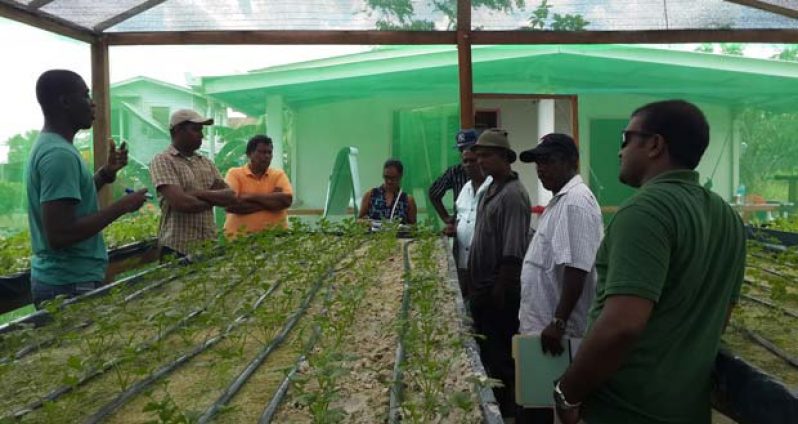THE Caribbean Local Economic Development Programme (CARILED) in collaboration with the Ministry of Local Government and Regional Development; Regional Democratic Council – Region 3 (Essequibo Islands/West Demerara) and the Canal Polders Interim Management Committee (IMC), successfully completed three training sessions in Greenhouse Technology for 36 farmers of Canal Polder Numbers 1 and 2 on October 15 – 16 2014.
This training workshop forms one aspect of the Canal Polders Green Initiative (CPGI), which seeks to provide sustainable economic opportunities and increase farmers’ productive capacity in Canal Polders through the demonstration, application and use of hydroponic technology. The training workshop encouraged the adoption of hydroponic technology among farmers in order to reduce the high production cost and improve the quality of local produce.
According to a media release by the Local Government Ministry, the training sessions were facilitated by Local Economic Development Officers, Ms. Shivana Persaud and Mr. Satya Dayaram, as well as Hydro-Green Products consultant, Mr. Colwayne Morris.
The training sessions were divided into theoretical and practical sessions that focused on hydroponic farming. The training sessions focused on the advantages of hydroponic farming compared to traditional farming, natural pesticides and disease control, sanitation and maintenance of greenhouse facilities. The practical sessions gave participants the opportunity to observe and discuss greenhouse features and engage in a demo-planting exercise. Participants were very interested in the hydroponic drip systems, substrates, availability of greenhouse components and access to finance
The release added that Mr. Dhanraj Singh, National Country Coordinator for CARILED, closed the workshop and noted that “the initiative is timely and will significantly boost the region’s capacity to deal with the challenges of climate change in the local agriculture sector.” Mr. Singh further explained that the Canal Polders project was meant to demonstrate partnerships between local government authorities and Canal Polders’ residents towards local economic development.
The Canal Polders Green Initiative project adopts a public-private partnership approach between local government authorities and communities that seek to develop and create jobs in local economies. The project also targets single mothers who depend on subsistence agriculture and should assist in closing the gender gap within the region.
CARILED is undertaken with the financial support of the Government of Canada, through Foreign Affairs, Trade and Development Canada. It is a six-year programme launched in May 2012, with headquarters in Trinidad and Tobago, and sub-offices in Saint Lucia (OECS) and Ottawa, Canada. The programme is implemented by the Federation of Canadian Municipalities (FCM), in partnership with the Caribbean Association of Local Government Authorities (CALGA), the Caribbean Forum of Local Government Ministers (CFLGM) and the Commonwealth Local Government Forum (CLGF). The programme focuses on local economic development and currently works in seven Caribbean countries to develop models of Local Economic Development that can be shared throughout the Region. It aims to partner with local government authorities to support the growth and development of Micro, Small and Medium Enterprises(MSMEs).



.jpg)








